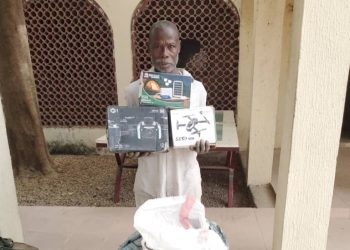By Abdulhamid Abdullahi Aliyu
Natural disasters remain a persistent challenge in Nigeria, with events such as flooding, droughts, and windstorms occurring frequently and with increasing intensity due to climate change. These disasters disrupt livelihoods, displace populations, and cause significant economic and humanitarian losses.
At the heart of Nigeria’s disaster management efforts is the National Emergency Management Agency (NEMA), a government body tasked with coordinating responses to natural and man-made disasters. Since its establishment in 1999, NEMA has played a critical role in mitigating the impact of these disasters, providing relief, and helping affected communities recover.
While NEMA’s efforts are commendable, there is still room for improvement to ensure that the agency can meet the growing challenges of disaster management in Nigeria. A balanced perspective highlights both NEMA’s achievements and the areas where further development and innovation could lead to more effective and efficient disaster response and risk reduction.
One of NEMA’s most notable strengths is its proactive approach to disaster response, particularly regarding flooding. As flooding is Nigeria’s most frequent and damaging natural disaster, affecting states like Kogi, Bayelsa, and Benue, NEMA has developed an extensive flood management system.
Early warning systems and pre-positioned relief materials have ensured that when floods occur, aid is delivered swiftly, minimising damage and loss of life. During the widespread flooding of 2024, which impacted over 30 states, NEMA’s rapid distribution of food, medical supplies, and temporary shelters saved lives and provided much-needed relief to millions.
In Maiduguri, the Borno state capital facing both insurgency and severe flooding, NEMA’s intervention was particularly crucial. The agency provided food, blankets, and medical assistance to displaced populations, established temporary shelters, and helped prevent disease outbreaks in the aftermath of the floods.
Similarly, NEMA’s collaboration with the Kano State Emergency Management Agency (SEMA) after the devastating 2023 floods in Kano, and its coordinated response in Jigawa following severe flooding in September, demonstrated its capacity to respond to large-scale disasters.
Despite these successes, NEMA faces significant challenges that limit its ability to provide timely and comprehensive disaster response. The increasing frequency of natural disasters, driven by climate change, has strained the agency’s resources and operational capacity.
Rising temperatures, unpredictable rainfall patterns, and deforestation are exacerbating flood risks, leading to more severe and widespread disasters. To meet these challenges head-on, NEMA will need to strengthen its operations in several key areas.
A major concern is NEMA’s funding. Disasters in Nigeria are growing in scale, and the resources needed to respond are correspondingly greater. NEMA has frequently been constrained by budgetary limitations, which affect its ability to pre-position relief materials, deploy personnel, and ensure rapid response times.
Increasing the agency’s funding and ensuring that resources are allocated strategically will allow NEMA to expand its reach and effectiveness. This could include establishing more regional offices and storage depots for relief supplies, enabling quicker access to affected areas.
Another way to improve NEMA’s capacity is through enhanced collaboration with international partners, local governments, and non-governmental organizations (NGOs). While NEMA has worked closely with the United Nations, international relief organizations, and the Nigerian Armed Forces, further strengthening these partnerships can help address operational gaps.
For instance, international partners like the United Nations Office for the Coordination of Humanitarian Affairs (OCHA) can provide technical assistance, training, and additional funding to support NEMA’s disaster response operations. Additionally, NGOs with local knowledge can help bridge the gap between NEMA and remote communities that are often hardest hit by disasters but may receive aid more slowly due to access challenges.
Technology has the potential to revolutionize disaster management in Nigeria, yet NEMA’s adoption of cutting-edge technology remains limited. By investing in innovative tools such as satellite imagery, geographic information systems (GIS), and drones, NEMA can improve its disaster monitoring and response capabilities.
These tools would enable real-time tracking of disaster events, allowing the agency to better predict and respond to crises before they escalate. Furthermore, mobile applications and digital platforms could be developed to enable more direct communication between NEMA and affected populations, providing timely updates and facilitating quicker evacuations.
NEMA has made significant progress in disaster risk reduction (DRR) by educating communities on disaster preparedness. However, these programs could be scaled up to ensure that more communities are empowered to take preventive measures against natural disasters.
A more localised DRR strategy could be developed, working closely with community leaders and local governments to identify specific vulnerabilities and craft tailored solutions. For instance, areas prone to flooding could benefit from localized flood defense systems, such as embankments, improved drainage, and flood-resistant housing.
While NEMA’s early warning systems have helped mitigate the impact of flooding, there is room for improvement. Investing in more sophisticated early warning infrastructure, such as weather radars and hydrological monitoring systems, would allow for more accurate forecasting of natural disasters. Better prediction models can provide earlier and more precise warnings to communities, giving them time to evacuate or take protective measures.
This would reduce the human and economic toll of disasters, particularly in rural areas where warnings are often delayed or less comprehensive. Beyond immediate disaster response, NEMA must focus on building long-term resilience within vulnerable communities. This could involve advocating for more sustainable land use practices, promoting reforestation, and working with agricultural experts to introduce climate-smart farming techniques that reduce the impact of droughts and floods.
NEMA should also collaborate with urban planners to promote better infrastructure development, particularly in flood-prone areas. By addressing the root causes of vulnerability, NEMA can help communities become more resilient and less reliant on emergency aid when disasters strike.
NEMA’s efforts in mitigating the impacts of natural disasters in Nigeria are praiseworthy, from its rapid response during floods in Maiduguri, Kano, and Jigawa to its proactive disaster risk reduction strategies. However, as natural disasters increase in frequency and severity, the agency must adopt a forward-thinking approach.
By addressing funding challenges, strengthening partnerships, embracing technology, and promoting long-term community resilience, NEMA can enhance its effectiveness and ensure that it remains a lifeline for Nigerians in times of crisis. With these improvements, NEMA will be better positioned not only to respond to disasters but to prevent them from becoming full-scale humanitarian crises, ultimately ensuring that Nigerians can face an unpredictable future with confidence and security.
Abdulhamid Abdullahi Aliyu, a youth corps member with Centre for Crisis Communication, writes via abdulhamidabdullahiali@gmail.com















